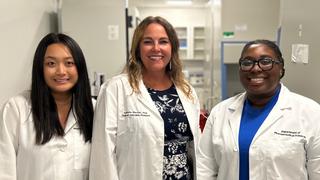A Summer Scholar Puts Cancer Under the Microscope
Caitlyn Ulmer ’24 is researching the potential to repurpose antipsychotic drugs as unlikely treatments for triple negative breast cancer.
 Left to right: Jennifer Nguyen, pharmacology and toxicology PhD candidate; Isabelle Mercier, PhD, chair of the Department of Pharmaceutical Sciences; and Caitlyn Ulmer ’24, pharmacology and toxicology major
Left to right: Jennifer Nguyen, pharmacology and toxicology PhD candidate; Isabelle Mercier, PhD, chair of the Department of Pharmaceutical Sciences; and Caitlyn Ulmer ’24, pharmacology and toxicology major
Caitlyn Ulmer ’24 has an unfortunate familiarity with breast cancer. The disease, which is diagnosed in more than 250,000 Americans each year, runs in her family.
Inspired by her personal experience, Ulmer has spent the last several months as a Summer Scholar in the lab of Isabelle Mercier, PhD, chair of the Department of Pharmaceutical Sciences, exploring the potential to repurpose drugs created for another use that could serve as unlikely weapons in the fight against one of the deadliest forms of breast cancer. With funding from the Janssen STEM Equity Research Summer Scholars program, she’s studying how and why some antipsychotic medicines inhibit or prevent the proliferation of cancer cells in the most aggressive forms of the disease.
Drug repurposing is the practice of taking existing medicines that have already been cleared by the U.S. Food and Drug Administration and repositioning them to be used in a way other than originally intended. In the pharmaceutical industry, where new drug development takes many years with countless obstacles along the way, repurposing offers a more efficient path toward finding new methods of treatment.
In the case of triple-negative breast cancer, which lacks any of the three receptors typically targeted by available treatments and leads to lower survival rates than other forms of the disease, time is of the essence for doctors and their patients. New targeted treatments are especially important because chemotherapy brings with it many adverse side effects such as damaging healthy cells in addition to cancer cells.
Ulmer and Mercier’s work together, which began when Ulmer first joined Mercier’s lab in January 2022, builds off prior research published by the Mercier group showing that the antipsychotic drug pimozide significantly decreases cancer cell migration and invasion, presenting the possibility of a novel targeted solution.
“We know it does prohibit proliferation and migration of triple-negative breast cancer; however, we don’t know which parts of the molecule are involved,” Ulmer says. “We have our theories, but we’re still trying to prove it.”
To that end, Ulmer, who is a pharmacology and toxicology major, is working to better understand how pimozide works at the molecular level to inhibit the STAT3 protein that encourages the spread of cancer cells in triple-negative cases. Specifically, her project will test pimozide and other novel compounds (synthesized by Assistant Professor of Pharmaceutical Sciences Jason Wallach, PhD) on both traditional two-dimensional cell cultures and also three-dimensional cell cultures that better mimic the human body — both of which she’s had to culture herself, in what she calls “the little work before the big work.” Once the cell lines are ready, she’ll use microscopy and computer analysis to measure how each drug contributes to the cancer cells’ trajectory — and whether it might be an effective treatment.
“The Summer Scholars Program has allowed her to take her project to a preclinical level with the models that she’s creating in the lab that mirror very closely how human triple-negative breast cancer evolves,” Mercier says. “And she’s doing that all by herself with the guidance of our PharmTox PhD candidate Jennifer Nguyen. If we didn’t have this funding she may not have been in the lab doing all this. She’s helping the lab, she’s helping science, and she’s learning at a fast pace."
Mercier said she’s seen Ulmer’s confidence grow during her time in the lab, where she is now serving as a role model for other undergraduate students who are part of the Explorers & Scholars program.
“She’s only two years senior to them but I think they’re seeing for themselves who they can become,” Mercier says. “Her confidence is contagious.”
For Ulmer, working in the lab has been an opportunity to learn about patience, perseverance and dedication. Alongside her graduate mentor, Jennifer Nguyen, who is working toward a PhD in pharmacology and toxicology and whose thesis serves as the foundation for Ulmer’s research, she’s improved her communication skills. From a practical perspective, she’s also learned how to maintain efficiency in the lab and has developed strength in experimentation as well as project planning and management.
“I’m learning skills that will prepare me for a lifetime,” Ulmer says. “Not a lot of people are able to experience this in their undergraduate years. It’s shown me not only what is expected of me, but also what to expect from the industry and the career path that I want.”
Ulmer isn’t yet certain what she’ll do after graduation, but continuing her research in graduate school is among the options. During her time in the lab thus far she has gained a different perspective on the disease she’s seen affect her family. Witnessing the way it works inside the body — and how its spread might be stopped — has offered her a deeper understanding of breast cancer and what people go through when living with it. Perhaps most important, though, is her newfound ability to see a brighter future ahead.
“There are things being done to combat this disease,” Ulmer says. “Everything you hear about it is negative, so just being in this lab and doing the work — seeing that things can get better over time and there are promising results and solutions for it — has been very fulfilling.”
